 Animals
Animals  Animals
Animals  Movies and TV
Movies and TV 10 Box Office Bombs That We Should Have Predicted in 2025
 History
History 10 Extreme Laws That Tried to Engineer Society
 History
History 10 “Modern” Problems with Surprising Historical Analogs
 Health
Health 10 Everyday Activities That Secretly Alter Consciousness
 History
History Top 10 Historical Disasters Caused by Someone Calling in Sick
 Animals
Animals 10 New Shark Secrets That Recently Dropped
 Movies and TV
Movies and TV 10 Forgotten Realities of Early Live Television Broadcasts
 Technology
Technology 10 Stopgap Technologies That Became Industry Standards
 Weird Stuff
Weird Stuff 10 Wild Facts About Taxidermy That You Probably Didn’t Know
 Animals
Animals The Animal Kingdom’s 10 Greatest Dance Moves
 Movies and TV
Movies and TV 10 Box Office Bombs That We Should Have Predicted in 2025
 History
History 10 Extreme Laws That Tried to Engineer Society
Who's Behind Listverse?

Jamie Frater
Head Editor
Jamie founded Listverse due to an insatiable desire to share fascinating, obscure, and bizarre facts. He has been a guest speaker on numerous national radio and television stations and is a five time published author.
More About Us History
History 10 “Modern” Problems with Surprising Historical Analogs
 Health
Health 10 Everyday Activities That Secretly Alter Consciousness
 History
History Top 10 Historical Disasters Caused by Someone Calling in Sick
 Animals
Animals 10 New Shark Secrets That Recently Dropped
 Movies and TV
Movies and TV 10 Forgotten Realities of Early Live Television Broadcasts
 Technology
Technology 10 Stopgap Technologies That Became Industry Standards
 Weird Stuff
Weird Stuff 10 Wild Facts About Taxidermy That You Probably Didn’t Know
10 Awesome Facts About South Korea
While its noisy northern neighbor usually gets all the attention, South Korea is a pretty awesome place. It has survived Japanese colonization, Soviet meddling, and North Korean threats to become the world’s 12th-largest trading nation. South Korea produces the LG TVs, Hyundai cars and Samsung phones we use every day. K-Pop stars are taking over the world one YouTube video at a time, and their films are receiving worldwide acclaim. However, there’s a lot more to South Korea than technology and Gangnam Style.
10Crime Reenactments
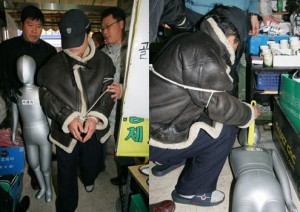
One thing South Korea is definitely not known for is liberal criminal rights. Anyone who has seen films like Sympathy for Lady Vengeance or Mother is familiar with the Korean practice of crime reenactments. Citizens suspected of committing crimes, such as rape or murder, are forced to take part in these humiliating public rituals, which start with police binding the suspect with ropes or handcuffs. They are then led to the scene of the crime and are ordered to recreate the criminal act. To make the ordeal even more humiliating, the media is invited along to publicize the event. Dates for the reenactments are even printed in newspapers so the public can show up, watch, and hurl insults.
In 1972, Jeong Won-seob was forced to act out the murder and rape of a schoolgirl, a crime he allegedly committed. As he acted out the event, people were screaming at him and yelling things like, “Kill this guy!” As horrible as this is, it gets even worse: Jeong turned out to be innocent. Despite the glaringly obvious problems with this procedure, the practice still continues today. The reasoning is something called “national sentiment” which basically means public feelings are more important than civil liberties. Obviously, not all Koreans agree with this viewpoint, and many are campaigning against the practice, but it seems the majority favors the public ritual despite the public opposition.
9Fast-Food Delivery
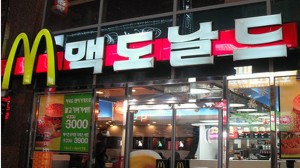
If you lived in South Korea, you’d never have to leave home to eat. Most restaurants will deliver straight to your apartment via motorcycle drivers—who are notorious for speeding through traffic to deliver the food on time. And after you’re done eating, you can just put your dirty dishes outside your door because the delivery guy will come for them later. That’s pretty awesome.
Almost all restaurants deliver, even McDonald’s, which gives new meaning to the term “fast food.” And if someone starts craving a few Big Macs at five in the morning, that’s no problem—McDonald’s will deliver 24/7. After all, hamburgers are the cornerstone of any nutritious breakfast. And if you ever do visit South Korea and decide to call up Mickey D’s in the middle of the night, you might want to try some of the Korean specialties, such as the Bulgogi Burger and the Shanghai Spicy Chicken Burger.
8Male Makeup

Despite a reputation for being uber-macho, South Korean men are obsessed with cosmetics. It turns out that South Korean men are spending close to $900 million a year on makeup. BB cream foundation is the product of choice, but facial cleansers, anti-ageing moisturizes, and eye creams are also extremely popular. There are even TV shows dedicated to the subject of the manly makeover. Up to 20 percent of the male population, known as the grooming tribe, use makeup regularly, but it’s not so much about fashion as it is business. The South Korean job market is extremely competitive, and wearing makeup is all part of the game. These guys want to make good impressions in their job interviews by hiding their blemishes and looking like celebrities. It looks like in Korea, makeup really does make the man.
7The Boryeong Mud Festival
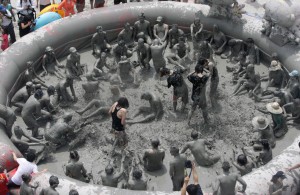
Since 1998, millions of people from around the world have been flocking to the Boryeona Mud Festival, which is exactly what it sounds like. For 10 glorious days, revelers ignore everything their mothers ever told them about playing in the mud.
Originally conceived as a way to advertise mud cosmetics, this popular Korean festival has grown enormously, attracting three million people in 2012 alone, including 22,000 foreigners. The gray clay is shipped from the Boryeong flats to Daecheon Beach where people take part in mud massages, mud photo contests, mud marathons, and best of all, mud wrestling contests. Top it all off with concerts and parties, and you have a festival that will cheer up any stick-in-the-mud.
6South Korean Robots
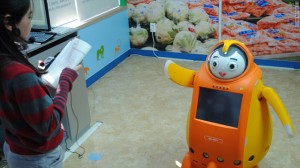
Robots aren’t just the stuff of sci-fi movies anymore. In fact, they’ve invaded South Korean classrooms. In 2010, the South Korean government launched its “R-Learning” program to fill schools with automated assistants like Engkey. There are two different version of this robo-teacher. One comes equipped with a TV screen which displays the face of an English-speaking teacher—who might really be as far away as Australia. The other model uses voice recognition technology to help students with their speaking skills. In addition to Engkey, preschool teachers use Genibo, a robotic dog that teaches dance and gymnastics, as well as iRobi, which keeps track of which kids are in class and asks them how they’re feeling.
However, not all Korean robots are friendly tutors who want to help you get better grades. Some just want to keep you in line. In 2012, a prison in the city of Pohang became home to the world’s first robotic prison guards. These guys come with 3-D depth cameras and two-way wireless communication systems that allow correctional officers to speak with the inmates. Sometimes the robots are controlled by guards with iPads, but sometimes they patrol the cell blocks on their own by following navigational markers. Thanks to “pattern recognition algorithms,” the robots can identify illegal or dangerous activities, such as gang fights or suicide attempts, and then call for human backup. Fortunately, these guys can’t touch the prisoners, and they aren’t armed.
However, the same can’t be said for the SGR-1. Deployed in 2010, this guy patrols the demilitarized zone between North and South Korea. Unlike its prison guard brethren, the SGR-1 is packing some serious firepower, including a 5.5-millimeter machine gun and 40-millimeter automatic grenade launchers. The SGR-1 can’t fire without human permission, but it’s pretty clear that the scientists who invented this droid have never seen Robocop.
5Romantic Holidays

Valentine’s Day is popular across the world, but in South Korea, it has a little twist. Unlike most countries where guys have to worry about flowers, candies, and cards, Valentine’s in Korea is all about the men. This is a day where women show the love by giving chocolates and gifts to their husbands/boyfriends. Of course, everything changes on March 14. Known as White Day, this is the holiday where men buy gifts for the girls, but there’s a catch: A guy is supposed to spend three times the amount of the gift he received on Valentine’s. And, as you might have guessed, the gifts are often in the color white.
However, these aren’t the only lovey-dovey days in South Korea. In fact, the 14th day of every month is a romantically themed holiday, or at least a day for reminding singles how unlucky they are. Some of these, like Kiss Day (June) and Hug Day (December) are pretty self-explanatory. January 14 is Diary Day, when couples and friends give each other blank diaries. The sappiness of Photo Day (September), when couples take photos of each other, is rivaled only by Yellow Day/Rose Day (May), when lovers dress in yellow and give each other, yep, roses. The saddest day of all is April 14, depressingly known as Black Day. This is when singles mourn their lack of love by eating “jajyangmyeon,” which are sticky, black noodles, all the while hoping to meet someone special before the next romantic holiday rolls around.
4Age
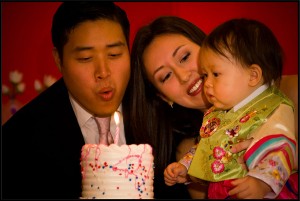
Traveling to South Korea is a bit like traveling into the future. The moment you step across the border, you automatically turn one year older. In Korea, a baby is one year old at birth, instead of zero as in most other cultures. And things get even trickier, since everyone has the same birthday . . . sort of. After the New Year passes, everyone in Korea automatically ages one year, even if they haven’t had their actual birthday yet. It gets even more complex for people who were born just a few days before the New Year. If a baby is born on December 31, it’d be one year old. However, after January 1, that same baby will automatically turn two.
So if you’re unsure of what your Korean age is, subtract the year of your birth from the current year and then add one. Or if someone asks your age, you could probably save a lot of hassle and just tell them what year you were born.
3The Biggest Church In The World
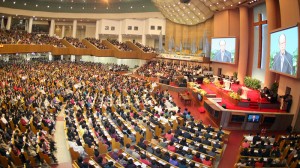
While the Yoido Full Gospel Church might not have the largest building in the world, it definitely has the biggest congregation. As of February 2013, this Seoul-based church had close to one million members. On any given Sunday, 200,000 of the faithful will attend one of the seven services, and that’s not counting the additional 200,000–300,000 watching on TV in other buildings and satellite churches.
To keep his spiritual flock spiritually fed, founder and pastor David Cho employs three orchestras, 12 choirs, hundreds of assistants, missionaries in 67 countries, and interpreters to translate his message into 16 different languages. If you want to hear one of his two Sunday sermons, you’ll have to show up a whole hour early, or you won’t be able to find a seat. Unfortunately, Pastor Cho might not be preaching much longer as he’s currently being investigated for breach of trust and tax evasion. He must have missed that whole “Render unto Caesar” part in the Bible.
2Baseball Was Established As A Political Move
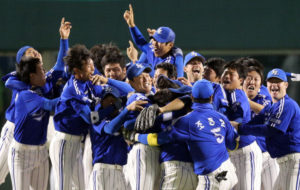
Introduced in the early 20th century by Christian missionaries, baseball has become one of the most popular pastimes in South Korea, and there are several interesting differences between “yagu” and the American version. For example, teams aren’t named after cities but after corporations, so there are the Samsung Lions, the Kia Tigers, and the Hyundai Unicorns. Korean baseball games feature female cheerleaders and fans enjoy kim-bobs, which are rings of seaweed stuffed with crab, lobster, and sausage.
However, the most interesting thing about Korean baseball is its dark past as the tool of an oppressive military dictatorship. After staging a coup in the late ’70s, General Chun Doo Hwan declared martial law in South Korea. Chun wasn’t the most popular guy in the world, and he was constantly having to crush revolts and murder protesters. He even shut down all the colleges in South Korea to prevent dissent. When none of those strategies worked, Chun came up with a much more devious scheme.
The Korean Baseball Organization was established in 1981 as a way for people, especially young men, to let off steam. By encouraging people to put down their picket signs and pick up a pair of thundersticks, Chun was hoping to divert attention away from his regime. A former defense minister was appointed as the baseball commissioner, six teams were created by government-friendly businesses, and Chun started improving his image by throwing the first pitch at every game. People eventually got sick of him anyway, and he and his cronies were thrown into prison. Talk about striking out.
1Blood Type

In South Korea, blood is a big deal. It doesn’t just deliver oxygen to the rest of your body—it determines your personality. People in South Korea are automatically stereotyped thanks to their blood type. While this belief originated in Japan, it has taken a firm hold in South Korean culture, and it might even make a difference in who marries whom.
There are positive and negative traits assigned to each blood type. People with Type A are thought to be conservative and punctual, but they can be also obsessive, uptight, and a bit introverted. However, they think that cheating on their romantic partners is wrong and will thus be extremely loyal. People with Type B are a totally different story. While they have some good traits like creativity and passion, they’re also willing to cheat on their partners, lazy, and impatient. There’s even a South Korean movie called My Boyfriend is Type B, a romantic comedy about a Type A girl who falls for a Type B boy and has to deal with his impulsive nature.
As for Type AB, they’re supposed to be cool and under control, but they can be elitist, harsh, and judgmental. Type O means a person is ambitious and athletic. They want big things in life, and nothing is going to stand in their way. On the flip side, they’re pompous and egotistical, but once they decide to commit to a relationship, they’re generally pretty loyal. So if you ever visit South Korea, you might want to figure out your blood type first—someone is going to ask eventually.
Nolan Moore was once bitten on the foot by an alligator, but he survived to become an ESL teacher. He hopes to avoid future alligator encounters and one day make it as a writer.








